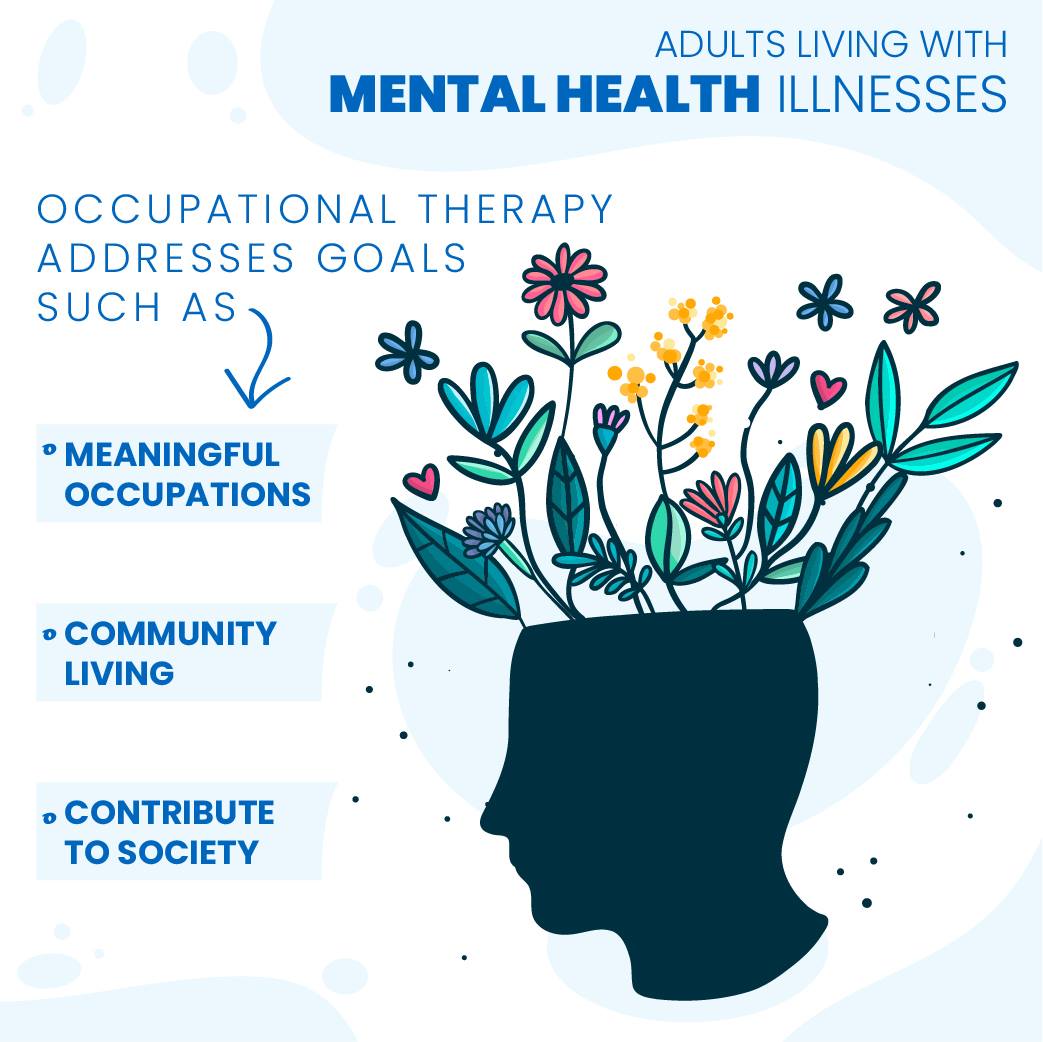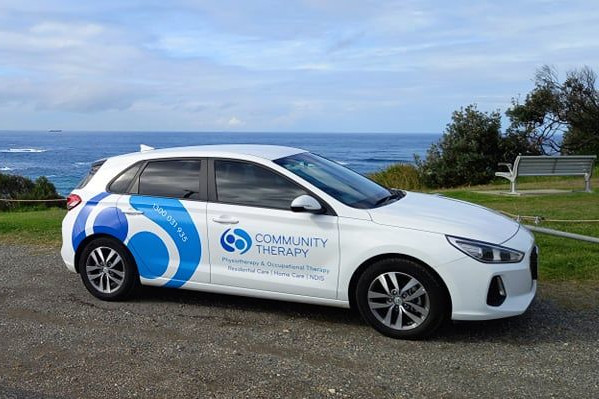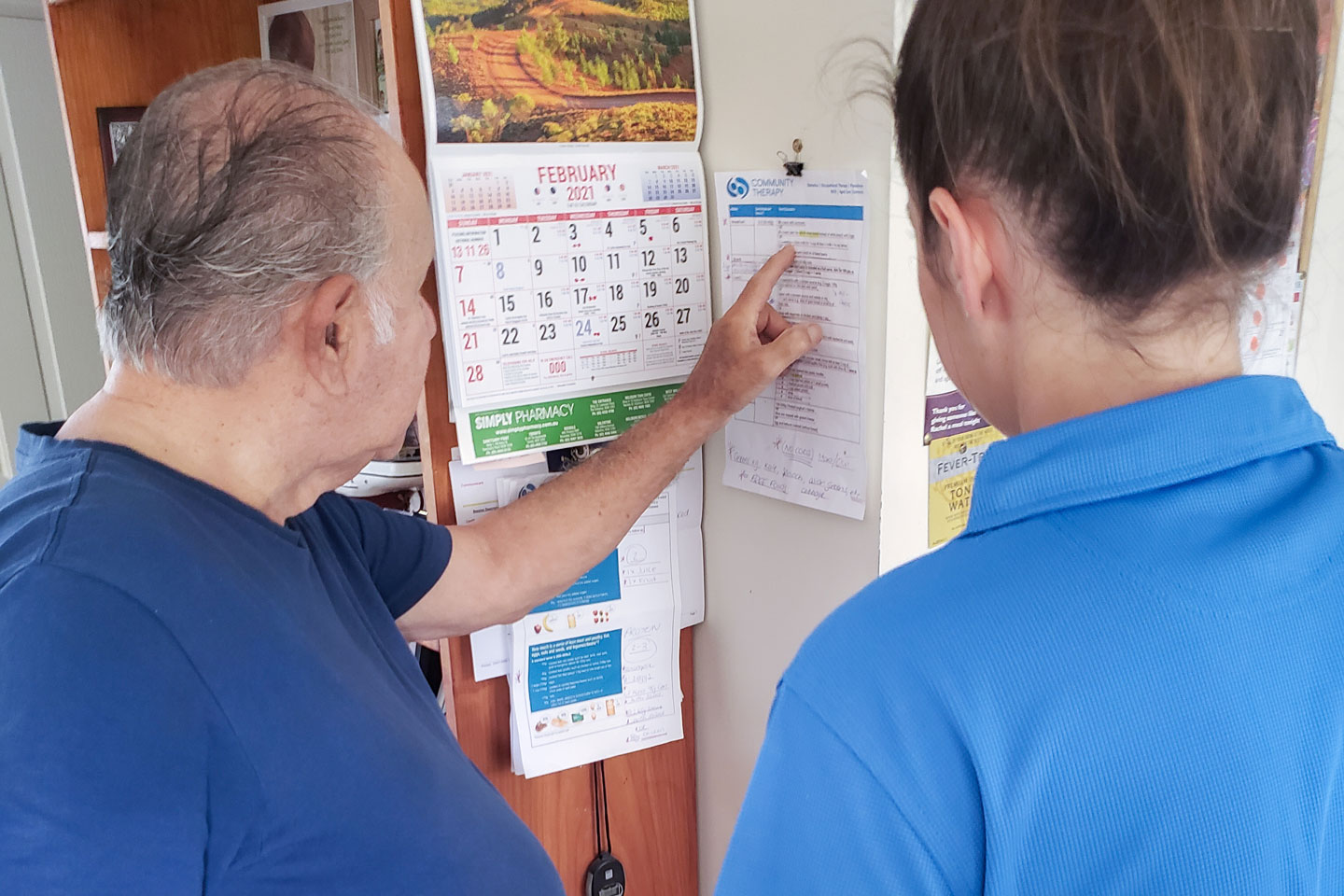Occupational Therapy for Mental Health
At Community Therapy, our Occupational Therapists support people who are living with disabilities living with seconday mental health conditions.
We are best suited to support people living with stable and mild to moderate mental health care needs.
Our role involves exploring ways that we can improve someone’s quality of life while assisting them to live as independently as possible.
The team at Community Therapy is skilled at supporting clients to identify specific and meaningful personal goals, and then applying appropriate interventions to achieve those goals.

The Role of Occupational Therapists in Mental Health
We assist each client to function and to re-engage in activities that can support their overall mental health and wellbeing. This may involve:
- Examining contributing factors such as health or other medical considerations
- Helping clients to access the community in the ways that they want to
- Getting clients engaged in meaningful roles or activities that suit them
- Developing coping strategies (for example breathing techniques)
- Developing strategies to help clients better understand and manage the challenges they face

Interventions and Supports
Community Therapy provides goal-directed and client-centred interventions to help each client improve their mental health and wellbeing.
Typical interventions focus on:
- Enhancing key skills
- Adapting environments or activities
- Identifying and avoiding causes for relapse
Some examples include supporting someone to:
- Obtain or maintain employment
- Manage stress levels
- Develop meaningful leisure interests
- Establish positive habits and routines
- Functional rehabilitation to promote independent living
Supporting someone to manage independent living can include a range of tasks. For example:
- Managing the home and associated domestic tasks
- Managing self-care activities
- Managing meal preparation and cooking
- Looking at how they access the community
- Helping with budgeting skills
- Managing their medication
- Providing evaluation and treatment for sensory processing issues

Challenges within Mental Health Care
There is a broad range of barriers that people suffering from mental health can encounter. Our team is very aware of these challenges. They include:
- A possible stigma associated with a mental health diagnosis
- Vulnerability that comes with a lack of skills in some areas (for example financial security)
- The absence of a core support or social network
- Challenges in managing or keeping long term housing and accommodation
- Long recovery times and the risk of relapse
In addition, motivation can be a significant barrier for those with mental health challenges. Achieving relatively simple tasks of daily living, such as getting out of bed, can become difficult for someone who is suffering from a mental health condition. Fortunately, there is a lot that can be done and we are here to help.

Appropriate Mental Health Referrals for Community Therapy
Our Occupational Therapists support people living with disabilities, with secondary mental health conditiones which categorised as mild or moderate.
This includes a wide range of people whose ability to participate in the activities of daily living is challenged by:
- Anxiety
- Depression
- Schizophrenia
- Post-traumatic stress disorder (PTSD)
- Bipolar disorder
- Personality disorders
For people with more complex mental health conditions, it is suitable to refer on to specialised services.
Please phone us and we’ll ensure we are an appropriate provider for you to consider before deciding.

Ongoing Therapy from Community Therapy
Creating a structured plan with clearly identified goals, timeframes and recommended interventions is critical to our success with our clients. It enables us to track progress and reflect on what is working and what needs to be adjusted.
At Community Therapy our recommended interventions are always evidence-based. They include a combination of:
- Ongoing therapy sessions
- Prescriptions for equipment
- Assistive technology
- Collaboration with other services (such as mental health specialists, general practitioners or behavioural therapists)
- Referral to disability and employment services or mental health caseworkers

Getting started with Community Therapy
Getting started with Community Therapy will typically involve an initial assessment to:
- Determine how mental health is impacting someone
- Identify any barriers to recovery
- Understand the client’s medical history
- Understand the client’s social background, including support networks, home environment, work and education status
- Understand their current capacity to manage the activities of daily living
- Understand how they are currently accessing the community
- Understand what their leisure activities and interests are
Understanding these factors means we can then support the client to identify meaningful personal goals. We work with them to develop a plan to overcome any barriers that they may be facing, and to help them to achieve their desired goals.

Mental Health OT FAQ
-
When is the right time to contact Community Therapy? If I am concerned about my mental health should I see a GP, a psychologist, counsellor, or the NDIS before talking to you?
Our Occupational Therapists support people living with disabilities, with secondary mental health conditiones which categorised as mild or moderate.
Contacting a health care professional such as a GP, Psychologist or counsellor before engaging an Occupational Therapist is definitely appropriate.
-
What training do Occupational Therapists have relating to Mental Health?
To become an Occupational Therapist requires completion of a four-year undergraduate or postgraduate degree.
At Community Therapy, we also have a structured system of regular, ongoing supervision. This involves examining case studies together with managers or senior staff members.
All of our practitioners are also required to undergo a minimum of 30 hours of professional development annually. This includes the completion of courses or attending seminars. In many cases, these relate specifically to mental health.
This ensures that our knowledge is always up to date with the latest evidence and industry best practice, enabling us to provide the very best service to our clients.
-
Is mental health a neurological disability?
Mental health problems are often referred to as psychiatric disorders.
Their exact classification can be dependent upon individual circumstances and diagnosis. For example, some cases of psychosis are induced by drug use, and in these cases the mental health implications could potentially be classified as neurological.
-
How can Community Therapy provide multidisciplinary care alongside other medical professionals or family members?
Consent is a significant factor here. In all cases, we would need consent from the client before engaging with their family members or other health practitioners.
If consent is obtained, involvement from family members can be very beneficial in the intervention process. We communicate with and work alongside family members or friends if it is going to help someone’s recovery.
In addition, we frequently see families in which relationships have broken down somewhat. If we can help to support the recovery of those relationships, then we do.
Community Therapy’s Occupational Therapists may also collaborate with other services including mental health specialists, GPs, Psychologists, Behavioural Therapists and support workers.

